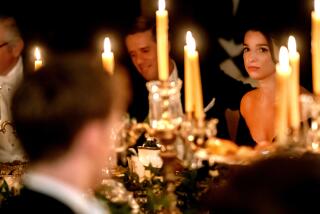Time Takes Teacher’s Intentions
- Share via
After Clarence, Robert was Mrs. Zajac’s most troublesome student. But Chris Zajac had liked Clarence. She didn’t especially like Robert. On the day of Kelly School’s Science Fair she would learn how badly she had failed him.
Last in a five-part series
Chris Zajac strode down the corridor toward her classroom. The halls were wonderfully quiet. Her skirt rustled. She quick-marched, hand swinging high. Her mind was filled with heated, exasperated thoughts about Robert.
Weeks ago, Robert had said he wouldn’t do a project for the Science Fair. She had tried to talk him into it, and finally, he had agreed. Robert was a genius at bringing out the worst in her.
Robert had crew-cut black hair. His wide face looked as if it had been cut from a square block. He was big all over, with the ample belly of a middle-aged softball player. He had an improbably squeaky voice.
He lived in an old, run-down apartment building in the lower-class Highlands, not many blocks from where Chris grew up.
Where had Robert learned that the best way to deal with failure is to embrace it? One time, after Chris handed back a test, Robert said loudly, “F! F’s my specialty!”
Another time, Chris told Felipe he had to stop leaning back in his chair. She tacked on a cautionary tale of a former student of hers who had fallen backward and cracked open his head.
“Did blood spurt all over?” said Robert, grinning.
Chris tried to add some fun to Friday’s spelling tests by putting the children’s names into sentences: “Firefly. Mariposa caught a firefly in her hand.”
“And squished it,” piped up Robert in his squeaky voice. He gurgled.
“Smother,” Chris said during one test. “You shouldn’t put a pillow in a baby’s crib, or it might smother itself.”
“That’d be a riot,” declared Robert.
Robert was capable. Chris had asked Robert’s reading group what sort of teacher she would be if, like the girl in the story they were reading, she didn’t care for her job.
“You’d let the kids do whatever they wanted,” said Robert without hesitation.
His misspent intelligence angered her.
“He could be at grade level. Easy. He could be getting A’s,” she thought.
Robert was one of those children who make it hard for a teacher to like them. Not quite consciously, but on purpose. She had kept telling herself that she admired his boldness and his outspoken hatred of school. But then he’d start gurgling over the idea of a baby being smothered or refuse to do a science project and shrug his shoulders when she asked why.
Chris stopped in the doorway to her classroom. Robert sat at a desk near the door, his broad back toward her.
“You! Get over here!” she said.
At the sound of Mrs. Zajac’s voice, Robert ducked his head. What lay on his desk was hidden from Chris for the moment.
“Pick yourself up and get to the office,” she said.
Robert stood up. His arms hung limply in front of him. His chin was pressed to his chest. His broad face was bright. He trudged, listing to one side, toward Mrs. Zajac in the doorway.
Chris looked at him. Something was wrong. He wasn’t smirking. He was clearly upset. She looked at his desk, then the tightness left her jaw. She let her shoulders sag, and her face turned as red as Robert’s.
On Robert’s desk, she saw a weathered scrap of 2x6 with raggedly cut ends. On each of its longer edges was a flashlight battery, precariously secured to the board by a profusion of bent and twisted nails. A tangle of wires, twisted around other nails, covered the surface of the board.
An attempt had been made to tape the ends of the wires to the batteries and to a small light bulb. The bulb had a broken filament. A hammer and some outsize nails lay on Robert’s desk next to his project.
He had tried to make an electric light.
It suddenly looked like a very difficult thing to do.
Chris looked at the project and she saw all at once a Robert slightly different from the one she thought she’d known just a minute ago. All year long, she had tried to get Robert to take a chance and make an effort. Now he had. He had tried, and he had sincerely failed.
And she had rewarded him with humiliation.
How many times had something like this happened to him in his life already? Was this the reason Robert behaved as he did? Is self-inflicted pain better than sadness and despair?
She looked at the lashed-up wires and bent nails on the dirty scrap of wood, and it was all there in front of her: He had no one at home to help him make an electrical light.
That was why he’d said he didn’t want to do a project. He wasn’t just being perverse.
“How stupid I am!” she thought.
She should have bent the rules and given him more help. She should have arranged a success for him. “How stupid I am!”
“Sit down, Robert,” she said softly.
He sat down at the desk and wouldn’t look at his project. He looked at his feet instead, arms dangling down between his legs. She sat next to him. “Why aren’t you coming to the fair?”
“Doesn’t work.” His voice was a squeak. He stared at the floor.
“When were you supposed to figure that out, Robert? Before now. Right, Robert?”
But her voice was very gentle. Not much of the year remained, but enough for her to make a change in herself, too. No matter how infuriating he might be tomorrow or next week, she wasn’t going to let herself feel truly angry at him again. He had let her see the wounded little boy inside the fat would-be comedian.
She felt like crying. At last, he had let her like him.
Robert made a series of little shrugs and began picking at the wads of black electrical tape on his project.
“Can you explain what it’s supposed to do?”
“No.”
She knew that he could. He had explained it very well last week, after she had directed him to books about electricity. The project showed that he did know how an electric light works. He just hadn’t been able to make it happen. Maybe, she thought, she could help him now.
“Robert, if you took a little longer now, it might work.”
“No,” he squeaked, still looking at the floor.
His jeans looked dirty. The sleeves of the heavy sweat shirt he’d begun wearing since the onset of warm weather were too long. The cuffs half covered his dirty hands.
She didn’t have time now to work with him on the project. She had to get back to the gym.
Anyway, the light bulb was broken, and she didn’t know where to find another in a hurry. She’d take him to the office and leave him there and try to forget about him for a while.
No, she couldn’t do that.
She’d take him to the gym and let him join his classmates and hope that the rest of this day would pass quickly.
Robert seemed to recover fast. He ambled around the gym, making snaky movements with his hands in the manner of the dancers in a then-popular TV video, done to a song called “Walk Like an Egyptian.”
Chris’ recovery took longer.
The fair ended with a ceremony after lunch. The parents had departed. The children sat in a huge, disordered phalanx on one side of the now dusty floor, and the teachers sat on chairs facing them. It was almost over.
Al Laudato, the principal, roared for quiet. Chris started giggling behind her hand. “Oh, God, our leader,” she murmured to another teacher.
Finally, the wave of giddiness passed and she wiped her eyes.
The team of Alice, Judith and Margaret got first prize. Arabella got the third-place ribbon and came bouncing up to get it. Chris felt glad that those children’s parents had helped them. Claude’s team got a ribbon for special effort. That was even better, because Claude had earned it all by himself.
“Oh, my God!” said Claude, receiving his ribbon.
Chris watched, and she smiled. She imagined Claude thinking, “I can’t believe this! I got a prize!”
But Chris stopped smiling when she turned her eyes toward Felipe. He was scowling. Felipe’s team hadn’t won anything. She glanced at the faces of Jorge, Ashley, Kimberly, Courtney. The faces of the losers looked not exactly sad but distant.
As more fortunate classmates took the ribbons, many of the losers watched with slightly opened mouths, like children gazing through the window of a toy store.
If she could, Chris thought, she’d give them all prizes. She’d go to Al tomorrow.
They couldn’t let this happen again next year.
Even the most troubled children had attractive qualities for Chris. Even the most toughened, she always felt, wanted to please her and wanted her to like them, no matter how perversely they expressed it.
She belonged among schoolchildren. They made her confront sorrow and injustice. They made her feel useful. Again this year, some had needed more help than she could provide. There were many problems that she hadn’t solved.
But it wasn’t for lack of trying.
She hadn’t given up.
She had run out of time.
More to Read
Sign up for Essential California
The most important California stories and recommendations in your inbox every morning.
You may occasionally receive promotional content from the Los Angeles Times.










